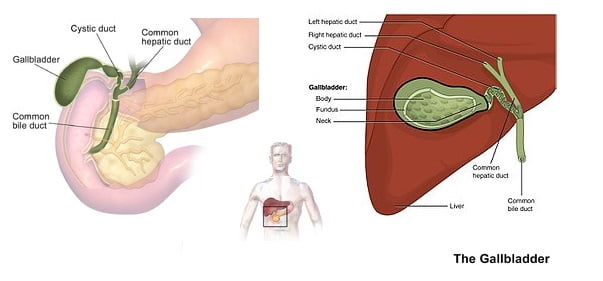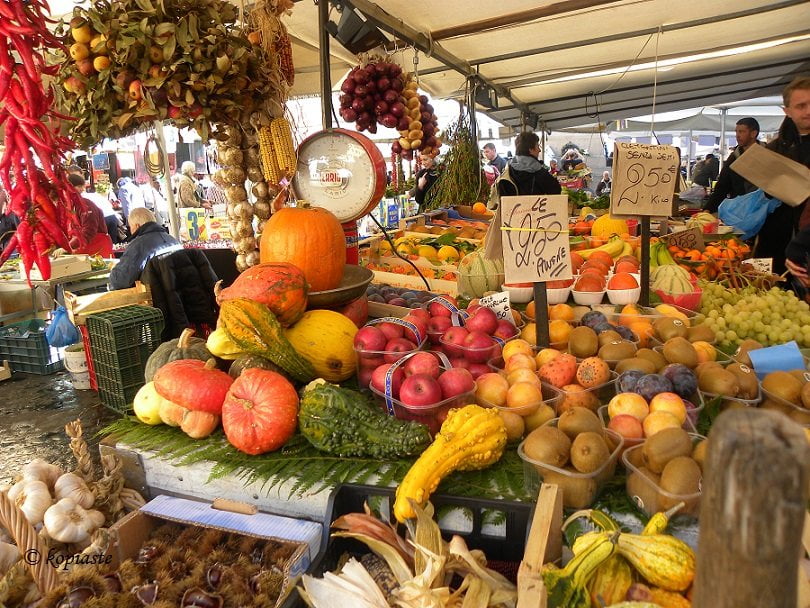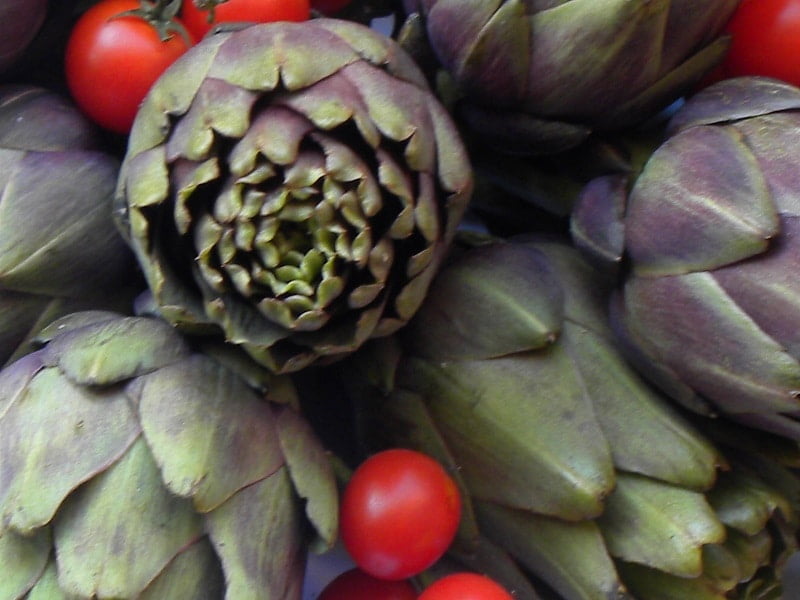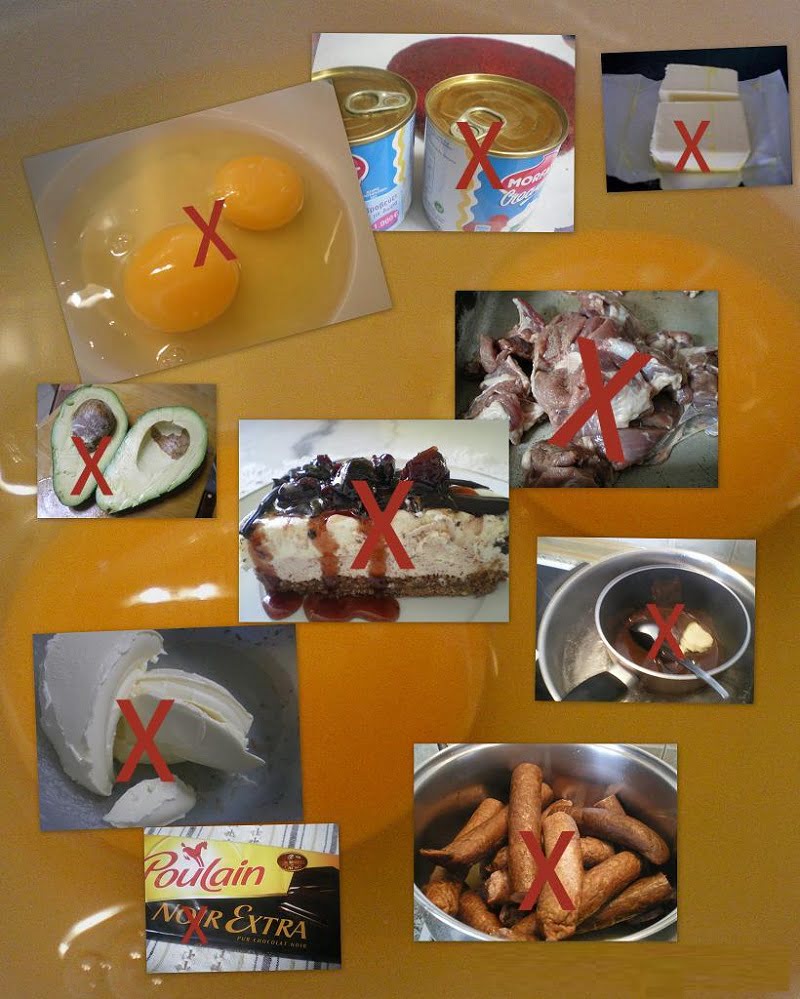What Foods Are Not Good for Gallbladder
Jump to Recipe
The gallbladder is a small pear-shaped sac located underneath your liver. Your gallbladder's main function is to store the bile produced by your liver and pass it along to the small intestine. Bile helps you digest fats in your small intestine.
The term "gallbladder disease" is used for several types of conditions that can affect your gallbladder.
Read more here.

In my last post I told you that my husband was in hospital but I did not have the time to explain in detail what happened. You can read about it in my other blog.

I have also had my gallbladder removed several years ago and I remember that I had to avoid fatty food, coconut, alcohol, caffeine, dairy etc.
However, when I found out that my husband also had stones in his gallbladder I did an online search to refresh my memory. The information I found is contradictory and although in one site you may read that you should eat something, in another you are told not to eat it.
I also tried to find relevant recipes but there were only a few, which I did not like, so this is one of the reasons I decided to record what I have prepared for my husband, which is based on the list and translation of the general instructions given by his doctor.
Disclaimer:
I'm not a doctor, I'm not a surgeon and I'm not a dietician. Each person may have different symptoms, so please consult your doctor before following this diet.
General instructions:
Ιf you have gallbladder disease and/or gallstones, following a healthy gallbladder diet can have a large impact on your health. A gallbladder diet is similar to a "regular" healthy diet with lots of fruits and vegetables, minimal animal fats such as dairy, butter, fatty meat, and eggs, no fried foods and "white" and processed foods should be avoided.
Foods that are recommended in diseases of the gallbladder should be low in fat (both saturated and unsaturated) and low in cholesterol and rich in fiber.
Saturated fats are found in red fatty meat, as well as animal fats such as full fat dairy products such as cream, butter, cheese, suet, tallow, lard, egg yolk, as well as certain vegetable products such as cocoa (chocolate), coconut oil, palm oil and hydrogenated oils (margarine, shortening). White meat (chicken, turkey) contain smaller amounts of saturated fats. Lean meats in general contain moderate amounts of saturated fats.
Saturated fats should be avoided in all chronic and acute cholecystopathies. In acute cases such as acute cholecystitis, gallbladder colic, cholangitis, empyema and gallbladder mucocele (hydrops), acute pancreatitis they should be totally avoided.
Cholesterol is present in large amounts in egg yolk, seafood (scallops, shrimps, prawns, crayfish, lobsters, octopus, squid, etc.), offal, kidneys, liver of animals and poultry and all fat meats and their products.
It should be noted that the consumption of foods that do not contain cholesterol (such as pasta, pastries, meats, oils, breads, etc.) causes the body to an overproduction of cholesterol and saturated fat, which ultimately is about the same as if one consumes foods that contain fat and cholesterol.
Food rich in cholesterol should be avoided in chronic cholecystopathies such as chronic cholecystitis, simple cholelithiasis, the cholesterinosis and adenomyosis of the gall bladder in acute situations where the saturated fats should be totally avoided.
Unsaturated fat is found in vegetable oils (soybean oil, sunflower oil, corn oil, etc.), nuts and fish. Olive oil contains mainly unsaturated and some saturated fat.
Unsaturated fat should be avoided and these acute diseases of the gallbladder (acute cholecystitis, gallbladder colic, gallbladder empyema, acute cholangitis and acute pancreatitis). In chronic diseases such as simple cholelithiasis and chronic cholecystitis, unsaturated fats can be consumed in small quantities and as long as the chronic situation does not become acute.

A healthy gallbladder diet
The meals should be taken three times a day and should always be in small portions. Additionally they should be cooked in a healthy way, without many sauces, salt and spices.
Sweets, sugar, pasta, white bread and bread products and dried legumes should be consumed in small quantities because they are fattening.
The same diet should be followed even after cholecyctectomy both in cases of laparoscopic or open surgery for a period of 1 1/2 – 2 months and always according to the doctor's advice.
After surgery, your diet should transition from liquids to soft solid foods. This diet is to reintroduce food back into your system after having surgery on your digestive tract.
After the lapse of the two months you can gradually add up food to your diet but limiting your fat intake as your liver still produces bile and continuously drips it into your digestive tract.
It is best to consume more "good" vegetable oils which should replace animal fat but care should be taken to consume them in moderation because these will also increase body fat.
Nutritional recommendations in Cholecystopathy
What to eat and What to avoid
| Yes | No |
| Potatoes, rice and pasta without butter with a little bit of olive oil of other "good" vegetable oil (in acute case the use of any oil may be terminated) | Fatty meat, such as lamb, duck, fatty minced meat, animal fat, charcuterie, tinned food, offal, liver, fatty meat products |
| Raw or cooked vegetables, fresh or frozen with a little or no olive oil. Dried legumes in small quantities with a little olive oil | Meat soups, chicken soups, fish soups, fried food in general, fatty pies with butter or too much oil, butter, shortening, too much oil, egg yolks, coconut oil |
| Lean meat in very small quantities, baked, grilled or broiled without any broth (beef, veal, pork or lamb or goat) | Fish roe, caviar, bottagra |
| Chicken, turkey, fish, grilled, broiled, boiled without the skin, in regular portions. | Skin of poultry, turkey or fish |
| Skimmed milk, low fat cheese, low fat yoghurt, low fat feta. Egg whites. | Cakes, cookies, biscuits, desserts with butter, cream, cream cheese, eggs or too much oil |
| Bread, rusks, cake without butter and little sugar. Ripe fruit, preferably without the skin | Alcoholic drinks. Avocados |
| Coffee, tea, herbal tea, vinegar. | Full fat milk or full fat dairy products |
| Spices in moderation, condiments in small quantities provided the food does not contain butter, eggs, fatty oils etc. | Fatty sauces with butter, cream, eggs etc |

When I spoke with my husband on Monday morning and he told me that the doctor told him he could come home, I was overjoyed firstly because my husband would come back home but also because I hated getting out in the cold, especially in the afternoon, after lying to rest for an hour.
This year was the worst ever winter I can remember in Athens. I compare it to the negatives in old films where you see everything reversed.
Everything is upside down. Our winters are usually mild, with a few days rainfall, a few days with low temperature around 10 – 12 degrees Centrigrade and the majority of days are sunny with temperatures around 12 – 17 degrees in January, around 18 – 22 or even 25 degrees in February and March, which sometimes is cold around 12 – 17 degrees but with lots of sunny days as well.
This year it was exactly the opposite. We had long stretches of consecutive rainy days, a lot of windy and cold, cloudy, consecutive days for weeks with very low temperatures, not exceeding 15 degrees. We did not see the 'Halcyon days' during January and the only sunny weekend I can remember was the one we went to Sparta.
I know some people may be laughing with us because they are used to temperatures below zero but for God's sake, we are in Athens, so we're not talking about freezing weather and our houses are not insulated properly for cold weather.
When it snows in Athens everything paralyzes because we never have tyres suitable for snow nor do we have chains for our tyres. All our clothes are suitable for milder winters, so it's natural to feel the cold even more.
Apart from all this cold weather, we did not have the best heating conditions even at home. This year we had to cut down on heating expenses because of the economic crisis so we only had heating for a couple of hours during the evening. During the day sometimes it's colder inside than outside.
Going to the hospital every day by public transportation was very difficult. I left home dressed very warm because our home was like living in Siberia, as due to the economic crisis, our central heating was on for just a couple of hours in the evening.
Reaching the hospital, was the opposite. Upon entering the hospital, it was like suddenly entering a tropical zone with 30 degrees C inside!!
The worst part was the one leaving in the evening to go back home and waiting at the bust stop for the bus to come!! Some times, I had to wait about half an hour!
Any way, I am glad this is now behind us and hopefully, I shall be posting some new recipes I have made for my husband.
Until then I have updated some older recipes because even if they are healthy, these have to be adjusted not to have many spices, eggs, full fat dairy etc.
Recipes adapted for Gallbadder Diet:
Deconstructed Pastitsio with Anthotyro and Paprika
Chicken with Leeks, Greek Yoghurt and Pesto
Anginares (Artichokes) a la Polita
Spaghetti Aglio e Olio with Courgettes, Spinach & Pesto
Perka sti Ladokolla (Perch en Papillote) with Rosemary & Garlic
Greek Fava Soup
Vegan Borscht (Beet Soup)
Artichoke & Celeriac Soup
Makaronia me Kima (spaghetti with Meat Sauce)
Milokopi (Bearded Umbrine) with Roasted Vegetables
Chicken or Turkey Burgers
Pumpkin-Potato Puree
Ingredients
What you can eat:
- Bread and bread products, rusks, crackers etc., without butter.
- Eggless small shaped pasta (preferably boiled and served with some olive oil) or boiled rice.
- Lean meat (veal, chicken, turkey), roasted or boiled.
- Lean fish (perch, pandora, cod, sole, mullet), grilled or boiled.
- Skimmed milk and products made from skim milk (low fat cheese, myzithra or other low fat cheese), Greek yoghurt (without the top crust), rice pudding, other puddings in small servings.
- Boiled eggs, only the egg white.
- Raw olive oil.
- Leafy greens boiled and served with olive oil, boiled zucchini, carrots, artichokes, fresh tomatoes without the skin.
- Boiled or baked potatoes or mashed potatoes.
- Ripe fruit, compotes, jams, fruit juices, jellies.
- Beverages (light tea, coffee, camomile).
- Desserts without butter, eggs yolks or heavy cream.
Instructions
Avoid eating and drinking:
- Food rich in cholesterol (lamb brains, egg yolks, butter, offal, sweetbread, cocoa,
- fatty meat or fatty fish).
- Pork, game, canned food.
- Sauces and spices.
- Ful fat milk and products made of full fat milk, cheese.
- Fried and sauteed.
- Charcuterie, salted cod, herring, sardines, pickles, seafood, cuttlefish, shellfish,
- octopuses, mussels, oysters.
- Olives, aubergines, okra, onions, cabbage, radishes, cucumbers, legumes, nuts.
- Cold food or drinks.
- Wine and other spirits.
Kopiaste and Kali Orexi!

What Foods Are Not Good for Gallbladder
Source: https://www.kopiaste.org/2012/03/gallbladder-diet-foods-for-gallbladder-problems/
0 Response to "What Foods Are Not Good for Gallbladder"
Post a Comment